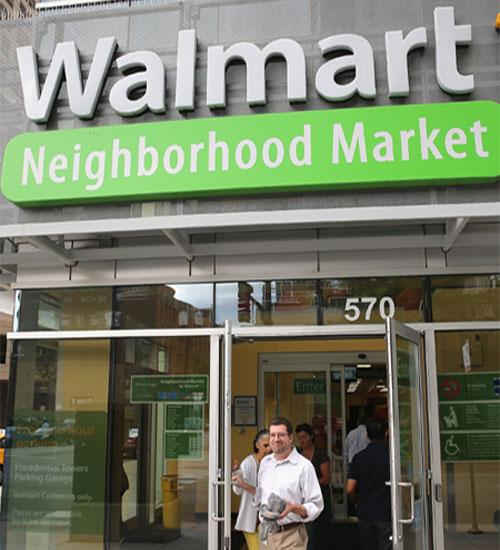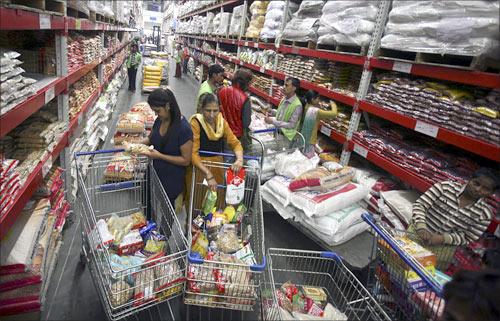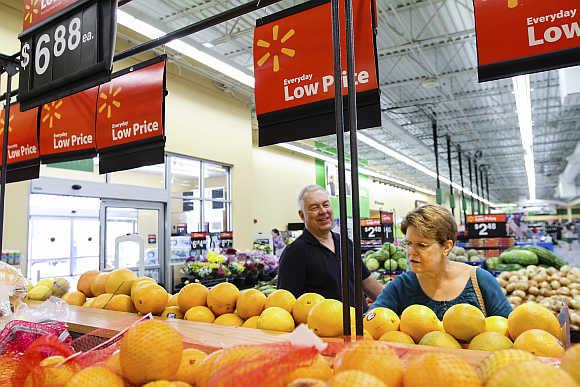Photographs: Scott Olson/Getty Images Nayanima Basu in New Delhi
American retail major Walmart has snapped ties with Indian partner Bharti but its plans to enter the country’s multi-brand retail space appears intact.
The company has urged the Department of Industrial Policy and Promotion (DIPP) to allow entry of private label suppliers as part of 30 per cent mandatory sourcing norms.
It has asked DIPP to amend the mandatory sourcing clause to introduce the concept of private-labelling. This, if allowed, would help the US retail behemoth bring in some of its international private labels that are keen to enter the fast-paced Indian retail market.
Walmart, which announced its break-up with Bharti on Wednesday, has sent to DIPP a detailed plan on the way it wants its private label suppliers to operate in India.
...
Walmart keeps the door open for India retail play
Image: A woman shops with her daughter at a Walmart Supercenter in Rogers, Arkansas.Photographs: Rick Wilking/Reuters
“They (Walmart) have suggested private labelling to be inducted in the sourcing clause. We are examining it and trying to understand the concept,” a senior DIPP official told Business Standard.
He said DIPP was trying to comprehend whether sourcing would be done from foreign markets or from India before taking a call on the issue.
Through its partnership with Bharti Retail, Walmart had brought in seven private labels —Great Value, Equate, Hometrends, George, Astitva, Mainstays and Simply Basic — offering a diverse mix of products in India at Easyday supermarket chain.
Private labels, popularly known as store brands, are owned by the retailers and sold at lower prices within their own outlets. Big retailers are able to sell these at lower prices, unaffected by margin worries, as the cost of marketing and advertising of these private labels is nominal.
...
Walmart keeps the door open for India retail play
Image: Customers shop inside a Best Price Modern Wholesale store, a joint venture of Walmart Stores Inc and Bharti Enterprises, at Zirakpur, Punjab.Photographs: Ajay Verma/Reuters
Indian retail biggies, such as Future Group and Reliance Retail, also rely on private labels to push their sales.
Even as the government has relaxed entry norms for foreign multi-brand retailers, Walmart has expressed its discontent over some of the conditions the policy lays out. Under pressure from international players, the government further eased the norms on some of the riders, especially the one related to the mandatory sourcing clause.
“They still have problems with the sourcing norm. We are trying to analyse what they are seeking,” the official said.
...
Walmart keeps the door open for India retail play
Image: A Walmart Neighborhood Market store in Bentonville, Arkansas.Photographs: Jacob Slaton/Reuters
According to the extant policy, foreign retailers can open outlets in the country on the condition that 30 per cent of their sourced sales would come from small to medium-sized domestic producers in India.
However, the definition of small sector has been expanded to include units with total investments of up to $2 million in plant and machinery (instead of $1 million earlier).
Walmart now wants to get this norm amended to fit in its private label suppliers.
STICKING POINT
- The mandatory MSME sourcing norm
- Up to 51% FDI allowed in multi-brand retail on the condition that at least 30% of requirements will be sourced from Indian micro, small and medium enterprises
- To attract FDI, the norm was eased by redefining the MSME sector to include units with total investments of up to $2 million in plant and machinery (instead of $1 million earlier)
- Still wary of the sourcing norm, Walmart has been seeking further relaxation






article